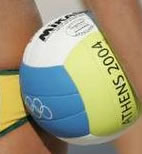 The “Today” show, my morning infotainment program, reported on the “controversy” about the dancers who appear during breaks at the Olympic women’s beach volleyball competitions. The spectators seem to like them — the dancers wear bikinis, which don’t conceal either their flesh or their abject lack of dancing skills — but some female athletes are miffed. According to Reuters,
The “Today” show, my morning infotainment program, reported on the “controversy” about the dancers who appear during breaks at the Olympic women’s beach volleyball competitions. The spectators seem to like them — the dancers wear bikinis, which don’t conceal either their flesh or their abject lack of dancing skills — but some female athletes are miffed. According to Reuters,
Australian player Nicole Sanderson was not impressed. “It’s disrespectful to have other girls in bikinis out there dancing,” she said while her partner, Sydney gold medallist Natalie Cook, said that if there were men out on the court dancing it could equal things out.
Strictly for informational purposes, I searched Yahoo News for pictures of Sanderson’s athletic attire. Sure enough, like the rest of the women, her bikini bottom has about the same amount of fabric as a small eye patch. (No, I will not link to the photos.)
“But it’s beach volleyball!” you exclaim. “They’re dressed for the beach!” That might make sense, but the male volleyball players wear tank tops and normal-looking shorts. Why do the women have to dress like they’re competing in a Daytona Beach best-buns competition?
You know the answer to that one. So these women play a sport where sex appeal is the primary draw, then they complain when the organizers of their events bring in dancers to keep the audience’s appetites whetted. Ladies, show up with your entire backside covered, and then we’ll listen to you complain.

I agree that’s there’s a little of hypocrisy going on here, but it’s still insulting that women’s sports need to be “augmented” by bouncing bimbos in order for people to watch them. It sucks the legitimacy right out of sport. Two wrongs don’t make a right and these women deserve more respect than they’re getting.
Funky, you’re right — which is why if you want respect, you should dress the part.
I think the cheerleaders don’t belong, and I would very much like the Olympics to go back to the amateur-only rules.
But to complain about clothing that has been -common- for at least a half a century is probably heretical.
Well, I think putting the best athletes out there is the primary mission of the olympics, so I’m not in favor of the amateur-only rules.
What I find laughable about these games is that nobody cares. Nobody’s going to see them, with 500,000 tickets left unsold and the IOC telling the Greeks to give them away to fill the stands. Maybe people are afraid of terrorism, so they stay away.
As far as beach volleyball… Wouldn’t a sports bra be more supportive than a small bikini I couldn’t fit over my fat head? It’s not much of a purity test for me either way; I don’t find overly skinny, tall, athletic women attractive. And I don’t have much interest in beach volleyball. So I don’t watch.
The sport’s governing body (FIVB) knows people don’t watch for the competition. They passed a dress code in 2000; I don’t know all of the details, but I do know that female players are required to wear a two-piece suit that cannot be more than 6cm wide at the hips, or they have to pay a $3000 fine.
Louis, I was all but certain you were repeating an urban legend — then I googled, and you are right! Apparently, the rule dates at least back to 1998, as I found a reference to it in that year:
http://sportsillustrated.cnn.com/more/volleyball/news/1998/11/18/brazil_quarters
Since feminism is dead, there is no one to lament the female body being treated like a sex object. A pity.
The differing notions of appropriate attire for sports in one era and another are interesting, because they vary for sport to sport, and not always in the “more revealing and sinful as society slouches toward Gomorrah” template. (Though I certainly wouldn’t deny that’s a factor, particularly in women’s sport.)
I can think of at least a couple of sports where attire is becoming less revealing because of competition pressure — most notably swimming (where shark suits are now the “in” style). There’s also the trend in some other sports, most notably basketball, boxing and soccer (my three favorite sports as it happens) of shorts and T-shirts following general fashion trends and becoming baggier, longer and less hip-hugging. I saw Muhammad Ali fight Jurgen Blin on ESPN Classic last night, after reading this blog item, and I couldn’t not notice the difference in cut and hemlines on the boxing trunks of that era (or the basketball shorts of the Bird-Magic-Dr. J era versus those of today).
In soccer there are specific performance concerns as to some of the attire. Baggier shorts allow for more felxibility, but tighter shirts (like the former Italian National team jersey by Kappa) that are form fitting make it more obvious for the referee to see someone pulling on the jersey of an opponent (and make it harder to grab as well). I don’t know the performance concerns, if any, of beach volleyball uniforms.
As for respect, male football and basketball events have had cheerleaders as an integral part of the entertainment for a long time. Its not just b/c women are playing beach volleyball.